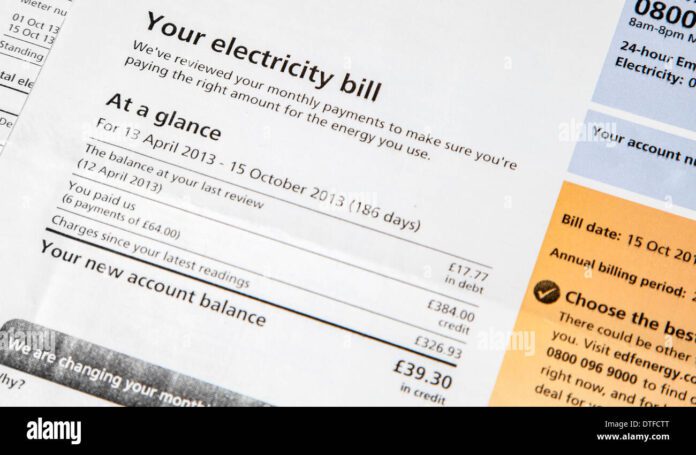- North Wales and Merseyside have the highest electricity bills in the UK, paying over £800 on average a year – £100 more than the area with the cheapest electricity costs: Northern Ireland
- North Scotland is the region with the second highest electricity bills, with households forking out £795 a year on electricity.
- Northern Ireland has the lowest electricity bills, paying seven percent less on average per year than the rest of the UK
North Wales and Merseysude have the highest electricity bills in the whole of the UK, new research can reveal.
Electricity costs in Merseyside and North Wales, which saw a 7.5 % hike in 2021 alone, are a nearly £50 higher than the average yearly electric bills for the whole of the UK and a full £100 a year more expensive than bills in Northern Ireland. Electricity bills in Merseyside and North Wales have increased nearly 30% since 2017.
The research, by energy experts Boiler Central, analysed new government data from the Department of Business, Energy and Industrial Strategy, to discover which UK regions had the most expensive electricity in the UK.
North Scotland has the UK’s second most expensive electric bills, with the average yearly bill for a household totalling £795 a year, and £66 a month. Households in North Scotland, which have seen a hike of 7.4% in electricity prices in 2021, pay £30 more on average than the rest of the UK.
The UK regions with the most expensive electricity bills
| Region | Overall: Unit cost (Pence per kWh) | Overall: Bill (Pounds) per year |
| North Wales & Merseyside | 22.49 | 810 |
| North Scotland | 22.09 | 795 |
| South West | 22.03 | 793 |
| South Wales | 21.90 | 788 |
| South East | 21.83 | 786 |
| London | 21.35 | 769 |
| Eastern | 21.23 | 764 |
| South Scotland | 21.21 | 763 |
| Southern | 21.13 | 761 |
| West Midlands | 21.06 | 758 |
| North East | 20.86 | 751 |
| Yorkshire | 20.76 | 747 |
| North West | 20.69 | 745 |
| East Midlands | 20.66 | 744 |
| Northern Ireland | 19.71 | 710 |
The South West, South Wales and the South East also have some of the highest electricity bills in the country. Electricity bills in the South West are an average of £793 a year, while residents of South Wales and the South East pay £788 and £786 respectively. London is high on the list of regions with pricey electricity bills, too, with residents of London typically spending £769 a year. However, as Londoners also have the highest average yearly wages of all regions surveyed (£31,878), they devote a smaller proportion of their annual salary to electricity bills than any other UK area – 17% less than the rest of the UK.
At the other end of the scale, Northern Ireland has the lowest electricity bills in the entire UK, with residents typically spending £710 a year. However, Northern Ireland is also the region where electricity bills have risen the fastest since 2017, with residents of Northern Ireland seeing a 36% jump in electricity costs in four years, compared to 28% for the rest of the UK.
In the past four years, the average UK electricity bill has jumped from £593 in 2017 to £765 in 2021. A total of 40 energy suppliers went bust last year due to the spiraling wholesale gas costs, and Martin Lewis of Money Saving Expert warns that energy the energy price cap will see another rise of 51% in April 2022, adding a further £600 to gas and electricity bills.
Myles Robinson, energy expert at Boiler Central, commented on the findings:
“The explosion of electricity costs across the UK is reaching a crisis point. With bills predicted to skyrocket a further £600 in the spring, it is becoming more and more impossible for families to meet these costs. Not only are energy prices rising for the nation, but several areas of the UK are already dealing with the consequences of regional differences in electricity bills. Energy generation across the UK isn’t equally powerful – while some regions have richer sources of fossil fuels and renewable energy, some regions struggle to generate energy as well as the rest of the UK, which leads to higher costs, and consumers having to pay a higher proportion of their wage towards energy.
While it’s important for consumers to do what they can to reduce their energy costs at home – including checking their properties are well insulated and seeing if there are quick fixes they can enact to reduce heat loss such as bleeding radiators, switching off lights, and looking into smart thermostats which make your energy use more cost-effective – unless the UK comes up with solutions on a larger scale to reduce the cost of energy, we are likely to see rising bills for some time”.
For further information click Boiler Central who commissioned the data
Help keep news FREE for our readers
Supporting your local community newspaper/online news outlet is crucial now more than ever. If you believe in independent journalism, then consider making a valuable contribution by making a one-time or monthly donation. We operate in rural areas where providing unbiased news can be challenging. Read More About Supporting The West Wales Chronicle
























